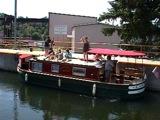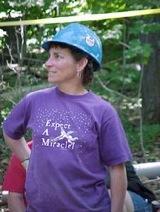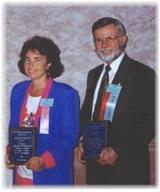SMART Benefits
Project SMART participants demonstrate changes in teacher and student learning through teacher led action research projects on wide ranging topics from focus on improving students English and language arts skills, to developing and disseminating projects that emphasize the applications of school science and math in the community, to reducing teacher and student stress and increasing focus and health through mindfulness practices.
Early on in its 28-year history, the effectiveness of the program was valided by the New York State Education Department's "Sharing Success" program.
The accomplishments of our teacher driven, professional development process have resulted in an unmatched reputation for success in improving K-12 instruction in Central New York and across the state.
Project SMART's "Kids At Work" is effective!
Early on in SMART's 28-year history, a National Science Foundation grant demonstrated SMART:
-
Improves students attitudes towards science and mathematics
-
Improves instructional practices in elementary science and mathematics
-
Increases parental and community support for improved science and math instruction
-
Helps children understand the linkage between school and work
-
Succeeds with all K-6 students including special education
Since that study, SMART has expanded to all curricular areas and grade levels.
What makes Project SMART special?
- Collaborative school/industry partnerships with rural, urban and suburban schools
- Real-world linkages
- An interdisciplinary, active, problem-solving approach to learning
- Family and community involvement in schools
What are Project SMART's accomplishments?
-
Developed deep, multi-year urban partnerships with high needs urban, rural and suburban schools in Central New York, Rochester, and Albany
-
Provided 4 years of Mindfulness-focused professional development to teachers across the state to broaden focus to the needs of the whole learner, addressing social emotional learning and trauma sensitive teaching.
-
Provided mindfulness, Generating Expectations for Student Achievement (GESA) and data strategies workshops for teachers, higher education faculty and preservice teachers.
-
Developed numerous hands-on problem-solving, inquiry method curriculum units of study
-
Incorporated the New York State (NYS) curriculum standards into each professional development offering
-
Provided awareness workshops and extended support to school districts adopting the Project SMART model throughout Central New York
-
Modeled industrial processes such as cooperative learning and team problem-solving
-
Received validation by NYS Education Department's "Sharing Success" program
-
Demonstrated success in improving teacher instructional practices, e.g., hands-on, inquiry method
What is Project SMART's reputation for success?
-
"Learning on a field trip was more fun. You can see science happen." -- Student
-
"If anyone can make it happen, a Project SMART teacher can!" -- School District Superintendent
-
"The children thought they were playing, but at the same time they were coming away with solid science & math concepts." -- Teacher
-
"Project SMART rocks!" -- Pre-service Student Teacher
-
"My child loves to do the science activities. It's not like when I was in school." -- Parent
-
"I've gained an appreciation of the challenges that educators face in seeking to make science & math meaningful to youngsters in their classes. My industry friends are interested in working on projects like this that improve educational opportunities for young people." -- Business Representative
-
"Partnering with business & industry has given me a new perspective on the workforce that our students will be entering as graduates. The school-business-university collaborative program addresses important goals for learning." -- School Principal
Impact on higher education:
-
Professional development for more than 60 arts and science and education faculty on teaching for inquiry, K-12 standards, data driven instruction, mindfulness in education, Math/Science/Technology content and pedagogy, and equity
-
Revised arts and sciences General Education courses (at least four science and three math) to be more inquiry oriented, to include more laboratory experiences, and to be more directly linked to K-12 Learning Standards
-
Enhanced College of Liberal Arts and Sciences, School of Communications, Media and the Arts, and School of Education relations
-
Revised teacher education courses (especially math and science methods, general methods, and student teaching) to be more closely linked to K-12 learning standards
-
Opportunities for college faculty, teachers, and business and industry representatives to collaborate and improve K-12 learning experiences connected to the larger community
-
Enhanced partnerships with the community
-
Enabled us to secure NSF and Title 2 funding for the Project SMART, and local funding from business and industry such as Entergy
-
Enabled SUNY Oswego to obtain NSF funding for a campus-wide “systemic reform initiative” leading to the development of interdisciplinary, inquiry-based arts and sciences courses
-
Provided support to develop our urban initiative including: visits to urban sites, establishment of partnerships with schools in New York City and Syracuse; Developed Summer in the City and Schools and Urban Society (2-week undergraduate immersion courses) participants, and more urban teaching placements
-
Provided a pool of highly qualified local teachers to work as adjuncts in our teacher preparation program
-
Increased emphasis on equity issues throughout our Elementary and Secondary Education programs via GESA, Data Strategies, and Poverty Workshop training
-
Support for faculty work in local Professional Development Schools
-
Implement our Kids at Work curriculum units (Sharing Success validated project) which encourages local business and industry to support education
Impact on pre-service teachers:
-
Opportunities for graduate and undergrads in work-study experiences in Project SMART
-
Enhanced field placement opportunities each semester when pre-teachers are placed with Project SMART faculty and teachers in local schools, and in Syracuse and NYC schools
Impact on in-service teachers:
-
Opportunity to participate in a yearlong site-based professional development each year for 100-125 teachers
-
Development of a regional Professional Development network of teacher leaders who regularly participate in local, regional, state, and national professional development conferences and programs
-
Hundreds of workshops on Inquiry Learning, Mindfulness in Education, GESA, Framework for Understanding Poverty, Data Strategies, and Kids at Work
- Professional development for thousands of regional teachers
-
Support for teacher study groups on Mindfulness, GESA, Data Strategies, and Effective Teaching in Oswego County’s PDSs and in urban partner schools
-
Support for teacher action research directed at improving student achievement
-
Involvement of teachers for planning for education change at the district, local, and state levels
Impact on parents:
-
Increased awareness of and support for school programs and their application to local business and industry (Project SMART Validation Study)
-
Opportunities to participate in Project SMART field trips
Impact on administrators:
-
Support of administrator collaboration with higher education and business and industry via Project SMART meetings, Project SMART supported field trips, and participation in Project SMART professional development activities

Water study on a boat
Teachers learn new skills that support "Kids at Work" projects.
Award Winning Project SMART
Teachers Explore the Shoreline.


